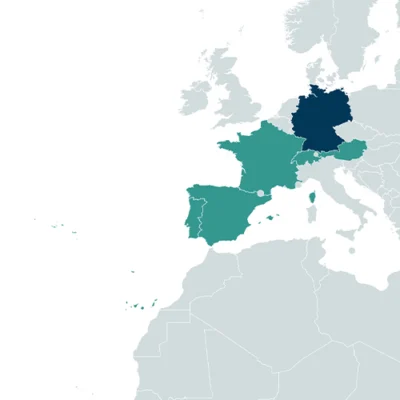Biodiversity monitoring of island ecosystems
Call
Duration
01/03/2024 – 28/02/2027
Total grant
Approx. 1,7 mil. €
More information
Holger KREFT
hkreft@uni-goettingen.de
Partners of the project
- Department of Biodiversity, Macroecology & Biogeography, University of Göttingen, Germany
- Department of Botany and Biodiversity Research, University of Vienna, Austria
- cE3c – Centre for Ecology, Evolution and Environmental Changes/Azorean Biodiversity Group (GBA), CHANGE – Global Change and Sustainability Institute, University of the Azores, Portugal
- Department of Botany, Ecology, Plant Physiology, Biology Section, University of La Laguna, Spain
- Institute of Biology, Laboratory of Conservation Biology, University of Neuchâtel, Switzerland
- Plant Populations and Bio-aggressors in Tropical Ecosystems Joint Research Unit, University of La Réunion, France
- Institute of Natural Products and Agrobiology, Spanish National Research Council (CSIC), Spain

Context
Oceanic islands contribute disproportionately to global biodiversity, hosting many endemic species with unique evolutionary and functional adaptations that reflect life in isolation. Simultaneously, islands are epicentres of biodiversity change, particularly vulnerable to anthropogenic disturbances such as habitat loss, climate change, and the introduction of non-native species. The impact of these anthropogenic drivers on islands has far-reaching implications, which BioMonI will emphasise, underscoring the importance of oceanic islands and related monitoring efforts at national, regional, and global levels.
BioMonI aims to empower local and regional stakeholders by providing them with standardised monitoring protocols, historical baselines, quantitative estimates, and co-develop future scenarios of Essential Biodiversity Variables (EBVs) and Ecosystem Service Variables (EESVs).
Main objectives
BioMonI aims at building a global long-term monitoring network specifically tailored to the pressing needs of biodiversity conservation and monitoring on islands. BioMonI will develop and implement a novel approach that considers mobilising existing monitoring data, identifying gaps in these data as well as in existing monitoring efforts, and developing and harmonising monitoring schemes for island biodiversity across the oceanic islands of the European Union and beyond.
Specifically, we will focus on:
- leveraging historical archives on EBVs and ESVs and providing the biodiversity
informatics and IT infrastructure needed to facilitate their valuation; - providing optimised and standardised field sampling protocols and tested methods that combine long-term monitoring with emerging technology such as environmental DNA and remote sensing;
- conducting targeted resurveys and establishing a network of new long-term monitoring plots;
- scaling up the monitoring of biodiversity and ecosystem structure, functioning, and services using remote sensing, macro-ecological modelling, and future scenarios.
Main activities
BioMonI encompasses different spatio-temporal scales, from unlocking palaeoecological archives to scenarios of future island biodiversity. Plot-based monitoring within BioMonI-Plot focuses on monitoring plant diversity, vegetation, and habitat structure using classic vegetation surveys and terrestrial laser scanning, as well as genetic and genomic tools. Unmanned aerial vehicles and satellite imagery will be used for scaling up field-based data and deriving EBVs and ESVs. Societal impact will be achieved through the creation and release of products such as maps of EBV and EESV for analysing the drivers of biodiversity change and evaluating future scenarios. Additionally, monitoring information will be made easily accessible across archipelagos to stakeholders, including researchers, citizen scientists, conservation managers, (non-)governmental organisations, and public institutions.
BioMonI will extend the Nature Futures Framework to adapt it to the island context, identify relevant actors and their interactions, and evaluate management strategies to achieve the goals of the CBD Post-2020 Global Biodiversity Framework (GBF). This process will be developed in close collaboration with local and regional stakeholders to ensure comprehensiveness and create ownership of the results among stakeholders and communities.



